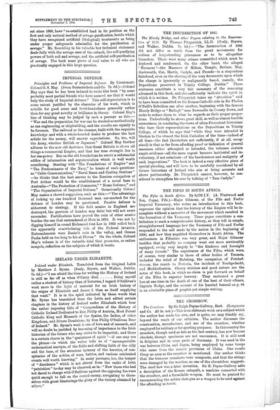IMPERIAL DEFENCE.
Principles and Problems of Imperial Defence. By Lieutenant- Colonel G. S. May. (Swan Sonnenschein and Co. 7s. 6d.)—Colonel May says that he has been induced to write this book "by some probably most partial friends who have assured me that it would help the study of Imperial defence." This self-depreciation is to some extent justified by the character of his work, which is notable for good sense and level-headedness generally rather than for any great novelty or brilliance in theory. Colonel May's line of thinking may be judged by such a passage as this :— " War and the preparation for war can be studied as methodically as can engineering or shipbuilding, and the results are equally to be foreseen. The railroad or the steamer, built with the requisite knowledge and with a whole-hearted desire to produce the best article for the money, will answer expectations. So, too, will the Army, whether British or Japanese." Colonel May further adheres to the now old doctrines that Great Britain is above all things a commercial Empire, and that her true strength lies in her sea-power. But on the old foundations he erects a substantial edifice of information and argumentation which is well worth considering. Starting with "The Foundations of Empire" and "The Predominance of the Navy," he treats of such questions as "Cable Communication," "Naval Bases and Coaling Stations" —he thinks that the best answer to the Russian occupation of Port Arthur would be the establishment of a naval base in Australia—" The Protection of Commerce," " Home Defence," and "The Organisation of Imperial Defence." Occasionally Colonel May makes a shrewd suggestion, such as this:—" The advantage of locking up one hundred thousand men ear-marked for the defence of London may be questioned. Passive defence is abhorrent to strategy. If the field armies in England are destroyed, the garrison of London may defer but will not avert surrender. Fortifications have proved the ruin of other armies besides the one that surrendered at Metz in 1870. It was not by digging himself in round Richmond that Lee in 1862 rolled back
the apparently overwhelming tide of the Federal invasion. Entrenchments were Banks's ruin in the valley, and Osman Pasha held on too long to his at Plevna." On the whole, Colonel May's volume is of the valuable kind that promotes, or rather compels, reflection on the subjects of which it treats.






























































 Previous page
Previous page